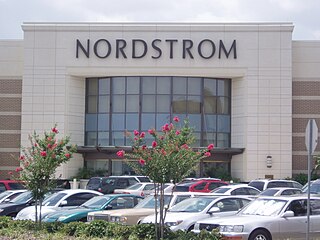
A convenience store, bodega, convenience shop, corner store or corner shop is a small retail store that stocks a range of everyday items such as tea, coffee, groceries, fruits, vegetables, snacks, confectionery, soft drinks, ice creams, tobacco products, lottery tickets, over-the-counter drugs, toiletries, newspapers and magazines. In some jurisdictions, convenience stores are licensed to sell alcoholic drinks, although many jurisdictions limit such beverages to those with relatively low alcohol content, like beer and wine. The stores may also offer money order and wire transfer services, along with the use of a fax machine or photocopier for a small per-copy cost. Some also sell tickets or recharge smart cards, e.g. OPUS cards in Montreal or include a small deli. They differ from general stores and village shops in that they are not in a rural location and are used as a convenient supplement to larger stores.

A supermarket is a self-service shop offering a wide variety of food, beverages and household products, organized into sections. This kind of store is larger and has a wider selection than earlier grocery stores, but is smaller and more limited in the range of merchandise than a hypermarket or big-box market. In everyday United States usage, however, "grocery store" is often used to mean "supermarket".
Tesco plc is a British multinational groceries and general merchandise retailer headquartered in Welwyn Garden City, England. In 2011, it was the third-largest retailer in the world measured by gross revenues and the ninth-largest in the world measured by revenues. It has shops in Ireland, the United Kingdom, the Czech Republic, Hungary, and Slovakia. It is the market leader of groceries in the UK.

A grocery store (AE), grocery shop (BE) or simply grocery is a foodservice retail store that primarily retails a general range of food products, which may be fresh or packaged. In everyday U.S. usage, however, "grocery store" is a synonym for supermarket, and is not used to refer to other types of stores that sell groceries. In the UK, shops that sell food are distinguished as grocers or grocery shops.

High Street is a common street name for the primary business street of a city, town, or village, especially in the United Kingdom and Commonwealth. It implies that it is the focal point for business, especially shopping. It is also a metonym for the retail sector.

A strip mall, strip center, strip plaza or simply plaza is a type of shopping center common in North America where the stores are arranged in a row, with a footpath in front. Strip malls are typically developed as a unit and have large parking lots in front. Many of them face major traffic arterials and tend to be self-contained with few pedestrian connections to surrounding neighborhoods. Smaller strip malls may be called mini-malls, while larger ones may be called power centers or big box centers. In 2013, The New York Times reported that the United States had 65,840 strip malls. In 2020, The Wall Street Journal wrote that in the United States, despite the continuing retail apocalypse starting around 2010, investments and visitor numbers were increasing to strip malls.

British Home Stores, commonly abbreviated to BHS and latterly legally styled BHS Ltd, was a British department store chain, primarily selling clothing and household items. In its later years, the company began to expand into furniture, electronics, entertainment, convenience groceries and fragrance and beauty products.
Somerfield was a chain of small to medium-sized supermarkets operating in the United Kingdom. The company also previously owned the Kwik Save chain of discount food stores. The company was taken over by the Co-operative Group on 2 March 2009 in a £1.57 billion deal, creating the UK's fifth-largest food retailer. The Somerfield name was replaced by the Co-operative brand in a rolling programme of store conversions ending in summer 2011.
Budgens Stores Limited, trading as Budgens, is a chain of grocery stores in the United Kingdom. The business was founded in 1872 by John Budgen, who opened the first shop in Maidenhead, Berkshire and was incorporated as a private limited company on 28 May 1962. The company is a subsidiary and retail fascia of Booker Group, part of Tesco plc.
Kwik Save is a British convenience store chain. Prior to 2007, it was also a discount supermarket chain that had shops across the United Kingdom. It went into administration in July 2007, but was brought back in April 2012. Its shops were small to medium-sized high street supermarkets, mainly located in areas with below average incomes.

A big-box store is a physically large retail establishment, usually part of a chain of stores. The term sometimes also refers, by extension, to the company that operates the store. The term "big-box" references the typical appearance of buildings occupied by such stores.

The New Economics Foundation (NEF) is a British think-tank that promotes "social, economic and environmental justice".

A retail park is a type of shopping centre found on the fringes of most large towns and cities in the United Kingdom and other European countries. They form a key aspect of European retail geographies, alongside indoor shopping centres, standalone stores like hypermarkets and more traditional high streets.
In the Republic of Ireland, the retail sector provides one of the largest sources of employment in the economy, representing over 12% of the workforce. As of 2017, approximately 40,000 wholesale and retail businesses employed almost 280,000 people in Ireland, with the Department of Enterprise, Trade and Employment reporting that 90% of these businesses were Irish-owned.

In US retail, an "anchor tenant", sometimes called an "anchor store", "draw tenant", or "key tenant", is a considerably larger tenant in a shopping mall, often a department store or retail chain. They are typically located at the ends of malls, sometimes in the middle. With their broad appeal, they are intended to attract a significant cross-section of the shopping public to the center. They are often offered steep discounts on rent in exchange for signing long-term leases in order to provide steady cash flows for the mall owners. Some examples of anchor stores in the United States are: Macy's, Sears, JCPenney, Nordstrom, Neiman Marcus, Saks Fifth Avenue, Dillard's, Kohl's, and Target. And in Canada; Hudson's Bay, Sears (formerly), Target (formerly), Zellers, Nordstrom/Nordstrom Rack (formerly), TJX Companies, Saks Fifth Avenue, Sporting Life.

Poundland is a British variety store chain founded in 1990. It once sold most items at the single price of £1, including clearance items and proprietary brands. The first pilot store opened in December 1990 following numerous rejections by landlords who had reservations about allowing a single-price store to operate, fearing it could adversely affect the local competition. An estimated 7 million customers shopped in Poundland every week in 2016, many being female shoppers in the C1, C2, D and E categories. Following a drop in share price of over 50%, Poundland was acquired in August 2016 by Steinhoff International for £610 million.

Retailing in India is one of the pillars of its economy and accounts for about 10 percent of its GDP. The Indian retail market is estimated to be worth $1.3 trillion as of 2022. India is one of the fastest growing retail markets in the world, with 1.4 billion people.
Mac Fisheries was a branded United Kingdom retail chain of fishmongers, founded by William Lever, 1st Viscount Leverhulme, the co-founder with his brother of Lever Brothers, which later merged to become Unilever.
The retail format influences the consumer's store choice and addresses the consumer's expectations. At its most basic level, a retail format is a simple marketplace, that is; a location where goods and services are exchanged. In some parts of the world, the retail sector is still dominated by small family-run stores, but large retail chains are increasingly dominating the sector, because they can exert considerable buying power and pass on the savings in the form of lower prices. Many of these large retail chains also produce their own private labels which compete alongside manufacturer brands. Considerable consolidation of retail stores has changed the retail landscape, transferring power away from wholesalers and into the hands of the large retail chains.












